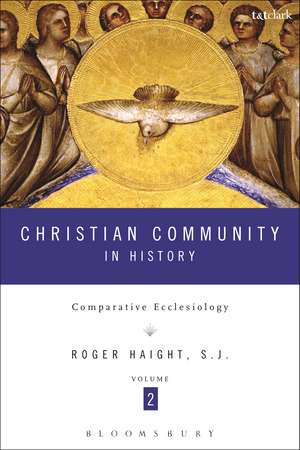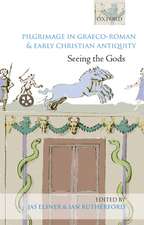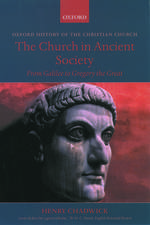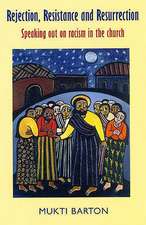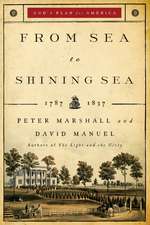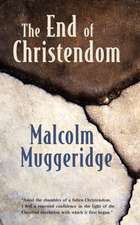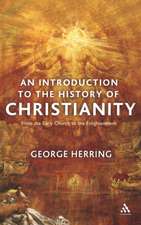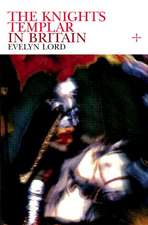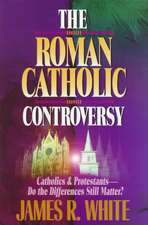Christian Community in History Volume 2: Comparative Ecclesiology
Autor Rev Prof Roger D. Haighten Limba Engleză Paperback – 18 iun 2014
| Toate formatele și edițiile | Preț | Express |
|---|---|---|
| Paperback (1) | 246.93 lei 3-5 săpt. | |
| Bloomsbury Publishing – 18 iun 2014 | 246.93 lei 3-5 săpt. | |
| Hardback (1) | 355.13 lei 6-8 săpt. | |
| Bloomsbury Publishing – 31 mar 2005 | 355.13 lei 6-8 săpt. |
Preț: 246.93 lei
Preț vechi: 278.80 lei
-11% Nou
Puncte Express: 370
Preț estimativ în valută:
47.26€ • 51.31$ • 39.69£
47.26€ • 51.31$ • 39.69£
Carte disponibilă
Livrare economică 02-16 aprilie
Preluare comenzi: 021 569.72.76
Specificații
ISBN-13: 9781623561260
ISBN-10: 1623561264
Pagini: 544
Dimensiuni: 153 x 234 x 41 mm
Greutate: 0.82 kg
Editura: Bloomsbury Publishing
Colecția T&T Clark
Locul publicării:London, United Kingdom
ISBN-10: 1623561264
Pagini: 544
Dimensiuni: 153 x 234 x 41 mm
Greutate: 0.82 kg
Editura: Bloomsbury Publishing
Colecția T&T Clark
Locul publicării:London, United Kingdom
Caracteristici
Discusses the dialogue between Christian theology and other religions
Notă biografică
Roger Haight, SJ, has a PhD from the University of Chicago (1973) and a STL from the Jesuit School of Theology in Chicago (1981). He has taught for over 30 years in Jesuit schools of theology in Chicago, Toronto, the Philippines, and Cambridge, Massachusetts. He has been a visiting professor in France, India, Peru, and Kenya. He is a past president of the Catholic Theological Society of America (1994/95). Jesus Symbol of God won 1st place in the Catholic Press Association's 2000 Book Award for theology. Dynamics of Theology won 2nd place in CPA's 1991 Book Award for Theology. His most recent work is Christian Community in History in 2 volumes. He currently teaches at Union Theological Seminary in New York City.
Cuprins
Part I: The Church in the 16th Century1. Luther's Ecclesiology2. Calvin's Ecclesiology3. The Church of England4. Anabaptist, Baptist, and Roman EcclesiologyPart II: The Church in the Modern Period5. Modern Ecclesiology6. 20th Century Ecclesiology: The World Council of Churches, Vatican II, and Liberation Ecclesiology7. 20th Century Ecclesiology: Orthodox and Pentecostal Ecclesiologies and BEMConclusion: Ecclesiology in the 21st CenturyBiblliographyIndex
Recenzii
"While maintaining the theological nature of his study, Roger Haight's historical ecclesiology lays a sturdy foundation in a historical, sociological analysis of the beginnings and development of the Christian Church from its origin in Jesus of Nazareth to the eve of the Reformation.... This is a groundbreaking volume... Haight has served all ecclesiologists well by initiating a way of looking at ecclesiology as it develops on the ground, so to speak. He has done it with theological integrity and clear analyses. He challenges us all to understand differences as values and the most appropriate way for the incarnation to continue through human history, honoring both the human and the divine whether in the stable or the palace of the council chamber." -Catholic Studies/ http://www.CatholicBooksReview.org/, 2005
Cover Story Feature on Haight -National Catholic Reporter, 2/25/05
The esteemed Roger Haight excels in addressing where the church and theology currently find themselves. This represents his most extensive work to date in ecclesiology and is a monumental two-volume study in comparative ecclesiology, building upon the insights developed in recent years in the more general subdiscipline of comparative theology.
"Roger Haight has made a major contribution to the area of ecclesiology. His contributions will clearly have a lasting value. This book is highly recommended for anyone interested in theology and the history of the Church." - Catholic Library World, September 2005
"Roger Haight's massive work, Christian Community in History, is a significant achievement... Haight writes clearly, with a deep historical sense and a good understanding of theological issues
[Part of a] landmark work ... For many who are familiar only with the ecclesiology of their own church or denomination, it can be a horizon-expanding experience. And for someone who has given up hope of the churches ever reaching an ecumenical understanding of church, it can give a sense of how that might be accomplished.
The result is indeed an intrguing florilegium of complex autobiographical accounts that not only reflect upon stages of one's intellectual development, but are also valuable records of the cultural, social and ecclesial setting of a particular epoch of general and church history in various corners of the world... The reflections are at once personal, conversational in style, not without gentle humour and a sense of self-effacement, and yet they also reveal the deepest convictions, hard struggles and long-lasting concerns that animate one's scholarly activity. The ultimate questions that we see as underlying these reflections concern the nature of theology and the identity of the theologian. It is highly personal amd yet universally valid answers to these twin-questions that make this book particularly interesting for everyone attracted by, in the editors' words, 'this wonderful discipline'. - Louvain Studies
"With the first volume of his 'ecclesiology from below,' Roger Haight has clearly again established himself as a pioneer in the creation of historical theology. Using historical study to recover as far as we can the actual experience of Christians in past centuries and then drawing on social scientific methodology to analyze this evidence, he has reflected on this 'data' theologically to distill the dynamics inherent in the development of structured Christianity. I eagerly await volume 2 that promises a truly theological tracing of Christianity's evolution from the Reformation to the present." -Bernard Cooke
Review in German in Theologische Literaturzeitung 131 (2006)
Cover Story Feature on Haight -National Catholic Reporter, 2/25/05
The esteemed Roger Haight excels in addressing where the church and theology currently find themselves. This represents his most extensive work to date in ecclesiology and is a monumental two-volume study in comparative ecclesiology, building upon the insights developed in recent years in the more general subdiscipline of comparative theology.
"Roger Haight has made a major contribution to the area of ecclesiology. His contributions will clearly have a lasting value. This book is highly recommended for anyone interested in theology and the history of the Church." - Catholic Library World, September 2005
"Roger Haight's massive work, Christian Community in History, is a significant achievement... Haight writes clearly, with a deep historical sense and a good understanding of theological issues
[Part of a] landmark work ... For many who are familiar only with the ecclesiology of their own church or denomination, it can be a horizon-expanding experience. And for someone who has given up hope of the churches ever reaching an ecumenical understanding of church, it can give a sense of how that might be accomplished.
The result is indeed an intrguing florilegium of complex autobiographical accounts that not only reflect upon stages of one's intellectual development, but are also valuable records of the cultural, social and ecclesial setting of a particular epoch of general and church history in various corners of the world... The reflections are at once personal, conversational in style, not without gentle humour and a sense of self-effacement, and yet they also reveal the deepest convictions, hard struggles and long-lasting concerns that animate one's scholarly activity. The ultimate questions that we see as underlying these reflections concern the nature of theology and the identity of the theologian. It is highly personal amd yet universally valid answers to these twin-questions that make this book particularly interesting for everyone attracted by, in the editors' words, 'this wonderful discipline'. - Louvain Studies
"With the first volume of his 'ecclesiology from below,' Roger Haight has clearly again established himself as a pioneer in the creation of historical theology. Using historical study to recover as far as we can the actual experience of Christians in past centuries and then drawing on social scientific methodology to analyze this evidence, he has reflected on this 'data' theologically to distill the dynamics inherent in the development of structured Christianity. I eagerly await volume 2 that promises a truly theological tracing of Christianity's evolution from the Reformation to the present." -Bernard Cooke
Review in German in Theologische Literaturzeitung 131 (2006)
